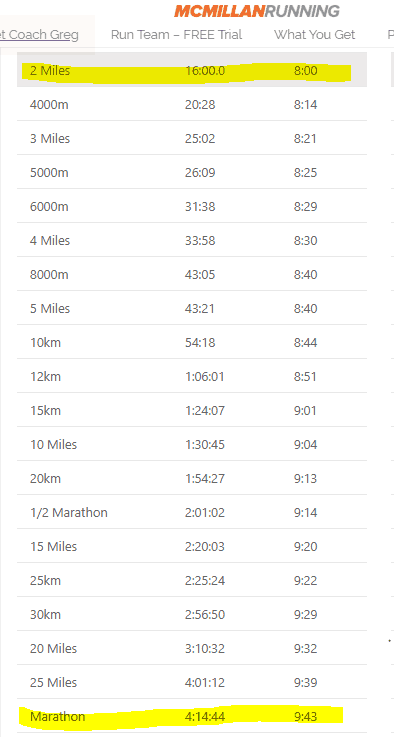Anyone who has trained for a marathon will tell you it’s no joke. Whether they felt prepared or not, the process takes a physical and mental toll. When I put it like that, it sure doesn’t sound that enticing, but honestly, that’s what makes completing the marathon such an achievement. Because in the end, it’s not just about the marathon. It’s everything it took to get there. Which is what everyone always wants to know: How long does it actually take to train for a marathon, or more specifically, how many weeks can you expect to put your life on hold to train for a marathon? Because I’m not going to sugarcoat it – marathon training takes some serious willpower, determination, and sacrifices. In order to be all in, and do your very best, you have to put in the weeks of work it takes to run your best marathon.
So, how many weeks does it take to train for a marathon? This article is all about training WELL for a marathon for someone who is ready. To do that, depending on how much of a base you have going into marathon training, you’ll need to plan for 16 – 22 weeks of marathon training. Each phase of the training serves a different purpose including:
- Base-Building Phase (5 weeks)
- Build-Up and Strength Phase (7 weeks)
- Peak-Mileage Phase (5 weeks)
- Taper Phase (3 weeks)
You’ve probably seen 12 to 15-week training plans but I really don’t recommend these. Even 16 leaves me feeling a little unsettled. Unless you’re a seasoned marathoner and you maintain a good base year-round, it’s just not going to be enough time to get the results that you want and without getting hurt (which I will discuss more!). My biggest advice is don’t skimp! If you’re taking the plunge to run a marathon, every single one of those weeks is important.
Here I’ll discuss why each of those weeks is so important and then recommend you to some of the best training plans available.
Why Your Marathon Training Needs to Be at Least 16 Weeks Long
In my mind, why would you put in the work for a beast like a marathon if you’re not willing to go all-in? If you want to train for a marathon in 12 weeks than that is entirely up to you. If you’re just looking to finish one, and are willing to walk some of it, then choosing to go that route could be completely fine. But my guess is once you cross that finish line (and I’m hoping you can avoid injury along the way), you’ll be wanting for more the next time around.
12 to 15-week marathon training cycle plans are out there…such as this one from all-about-marathon-training.com. The highest mileage week in this plan is 41-42 miles. Here are the two problems I see here for reaching your potential. 1) 42 miles is not enough mileage to get the time that you are capable of. Reaching higher mileage really does matter, as I dive into in this article: “Want to be prepared for your marathon? Run More Miles.” And 2) Going from 16 – 42 miles in the space of 10 weeks would be a recipe for injury for a lot of people. She even says that this plan “takes you at a rapid pace from a long run of 6 miles to a long run of 20 miles in just 12 weeks.”
People have absolutely trained for a marathon in 12 weeks with no issues. But, in my eyes, it’s risky. And it’s like taking 8-minute abs, down to 7, then 6…you get the idea. There will always be people looking for a shortcut…to get faster and stronger with the least amount of work possible. And it just doesn’t work that way, unfortunately.
via Gfycat “No! Not 6, I said 7! Nobody can get a workout in 6 minutes!”
If you’re here, then I know you’re ready to commit to training for a marathon. And that means putting in the hard work for the long haul even on the days you don’t want to.
Trust me, I have been the person looking for a shortcut. And it didn’t end well for me, quite honestly. I finished a marathon, and I WAS proud of that. But the last 8 miles I felt like complete crap and I ended up walking a significant portion of those miles in my first two marathons. I had a lot to learn and it made me hate the marathon distance at the time. I don’t want you making the same mistakes that I did. Because guess what happened when I came back to marathoning 10 years later? I was ready to put in the work, for 18 weeks, and it led to a 1-hour PR!
Having Enough Training Weeks Means You Can Reach Peak Fitness Without Getting Injured
So, let’s talk about two things that are absolutely necessary for a quality training program when it comes to the marathon distance.
Number 1: Hit at least 45-50 miles for peak week.
Getting in the mileage matters a lot. Did you know that your mileage should actually be 75-80% in the easy zone? This is NOT about pushing yourself to the limit every time you run, it’s about getting time on your feet. Doing so gets you extremely fit – and ready for every single mile of your marathon. I personally think hitting 60 miles is my personal magic number, but everyone will be a little different. Elite runners run up to 100 miles per week or more!

So what does this have to do with how many weeks it takes to train for a marathon? Well, you can’t safely hit 50 miles per week if you’re in a really short training cycle. 18 – 20 weeks is really necessary to do this. I mean if you already have a solid base of 30 miles+ you could, but if you’re here looking for this info, I’d say that’s fairly rare. Plus, marathon training if much more focused than just going out for any sort of runs you want to do.
It can be hard to see the big picture of why all these miles matter, but you will see that your training really counts when you get to that last 10k of your marathon. People who have run multiple marathons will tell you this is what it all comes down to. You can feel great those first 20 miles, but if you haven’t properly trained, those last 6 miles will get slower and slower. TRUST.
Number 2: Build gradually so you don’t get injured.
Say you don’t really care all that much about what time you get in your marathon. That’s totally fair! Some people’s initial goal is to say they did one and check it off the ol’ bucket list. And I am all for that. The risk here is that a lot of these training plans you find on the Internet is that the mileage builds way faster than your body can handle. (Especially if you’re pushing age 40 and beyond like me.)
According to Dr. Ryan Hudson, who was interviewed for the ScienceLife publication by the University of Chicago Medicine, overuse and under-conditioning are the primary causes of common injuries runners face in their training. The thing with runners is that they can get overzealous about their upcoming marathon training. We’re a dedicated bunch and therefore that means injury runs rampant among marathon runners. Not because marathons hurt you, but because runners are notorious for doing too much, too soon. Greg Mcmillan, one of the masters behind marathon training (IMHO), talks in-depth here about the need for the body to adapt. And that requires a constant stress/rest cycle so you won’t get injured.
If you utilize a training plan that’s too short, you end up trying to fit way too much “stress” into a short number of weeks. This is not going to get you to the starting line of your marathon healthy and ready to do your best. Each phase of training is important to get you prepared to run your best and stay injury-free.
Expectations for Each Phase of Marathon Training
Because a 20-week training cycle is a solid time to train for a marathon (and the length that I prefer), I’m taking those 20 weeks and splitting them into each of the phases you’ll move through during your training. A little shorter or longer training phase will look similar. 17-18 weeks can work for most people. I just know that those couple of extra weeks allow for a little wiggle room in case I have a little setback due to illness or something else, and then I won’t overdo it when I shouldn’t be.
Base-Building Phase – Weeks 1 – 5
The specifics of base-building is outlined perfectly in this article by McMillan Running. In fact, you need to come into marathon training with a solid base already. You should NOT be training for a marathon from scratch. Marathon training shouldn’t start until you can comfortably run 20 miles per week at a minimum (and have built up to that).
Here are your goals during a base-build prior to starting training as well as these first few weeks:
- build your aerobic capacity – get that heart in shape!
- build durability in your muscles and skeleton – to do this you need to time on your feet
- allow your body to increase its ability to burn fat as a fuel source (this will matter a lot when you get to miles 20+ in the marathon)
- get your body’s fast-twitch fibers to be able to withstand more endurance
- get your mind right – this is all about showing yourself that you CAN push yourself to run further than you ever have before
You’ll want to find a quality training plan that incorporates gradual base-building mileage that’s unique to the level you’re coming in at.
Strength and Anaerobic Development Phase: Weeks 6 – 12
The build-up and strength phase will continue to incorporate base-building runs. Easy runs to get the miles in as well as longer long runs over time both have the ability to increase your base. What the anaerobic and strength phase is all about is getting you to be a stronger and faster runner. Tempo/Speedwork and hill work are two important components of this phase.
Tempo and Speed Work
Though the “long run” is synonymous with marathon training, it’s not the only important piece. Yes, you will still build up your long week each and every week throughout training, but by several weeks into marathon training, adding in tempo work and speed interval training are important, too.
Tempo runs are “comfortably hard” runs that can be sustained for at least 20 minutes. This is not quite your 5k race pace, but should be about 25 – 30 seconds slower (getting close to 10k race pace.) So not an all-out effort. But there are both physical as well as psychological benefits to doing these types of runs.
Additionally, any good plan will have some speed interval training built-in, as well. Not sure what paces to use? I personally love this calculator from Mcmillan Running – once you put in your current race times and goal race times, it will give you paces to hit for different types of runs you’ll do during marathon training.
Hill Work
Hills are an important part of developing your meet the demands of a marathon. Even if the marathon you’ll be running is flat, hill work will still improve your performance. Lots of people refer to hill work as “speed work in disguise.” Though you may not be going “fast” on these hills, the rate of perceived exertion can be similar to speed work on a flat track. Running on hills builds leg power and gives you extra flexibility you wouldn’t get otherwise. Don’t have any hills in your area? Go find some stairs!

Peak-Mileage and Volume Phase: Weeks 13 – 17
These are the weeks where you’ll start honing in on that marathon specific training. It’s the time when you need to get comfortable with what your marathon pace will be. And you’ll need to figure out what that pace will be before you even start your marathon training – here’s a great way to figure it out:
Prior to starting training, run a 2-mile time trial. Then go to the Mcmillan Calculator and that will give you a great baseline for what kind of marathon time you are capable of (as long as you have a long enough training plan and do the work!) Here’s an example:
Let’s say you can run your 2-mile time trial in 16 minutes. Implement this in the calculator and it will take you to your predicted race times. Here’s what it will look like:

If you’re saying to yourself – there’s no way. I’m telling you – this thing is incredibly accurate. The potential is ABSOLUTELY there.
Ok so back to getting that marathon specific pace down. The person above would want to do any “marathon pace” specific training at about a 9:43 pace. It’s important to know that that exact pace feels like over a sustained distance. (This, however, does NOT mean your long runs are all done at this pace. These will be significantly slower with maybe a few MP miles built in.)
Lastly, you’ll want to have enough time to get in 3 long runs of 20-21 miles during this timeframe.
Taper Phase: Weeks 18 – 20
By the last 2 – 3 weeks of training (no matter what your overall total weeks were), it’s time to taper down your training. This is where you’ll significantly reduce your number of miles per week to prepare your body for race day. All that cumulative fatigue you’ve built up over the last 15-18 weeks has made you a strong and ready runner. This is the time to trust your training, and allow your body to rest, heal and get those legs fresh.

Using the Right Plan for Those Marathon Training Weeks
So now you know how many weeks it takes to train for a marathon – and do it right. 17 – 22 weeks is what you’ll need – with 20 weeks being that sweet spot for some. Scrambling to start training 15 weeks out from a marathon you really want to do just isn’t a good idea. Be sure to prepare well in advance for a race you have your eye on. Once you have chosen your race and given yourself a good base, it’s time to choose a solid, trusted training plan to commit to.
These are my top picks as a great place to start:
These training plans that have been tried, tested, and trusted by countless runners. And they have the research to back up their principles. Although these are very different training plans, it’s likely that one of them will work for you. Here’s a quick peek into each one and then make sure you take the time to research them thoroughly. And while you’re doing that, I highly suggest continuing to build that base so you’ll be ready when the time comes.
New to the marathon distance? Many people start by utilizing one of Hal Higdon’s plans. These training programs are 18 weeks long. There are many options to choose from depending on your level and a simple printed plan is free! You can also use the interactive plans through Training Peaks for $40. There is an app option to utilize to track your runs, as well.
Greg McMillan’s training plans are 16-17 weeks long and also include strength training to reduce injury. There is also an 8-week supplement plan you can purchase to build up your base (which you’ll need if you’re not coming into training with a comfortable 25 miles per week.) There are many choices and a printed plan costs $50 with an extra coaching option, as well.
The Hanson Marathon Method (in which the longest long run is 16 miles but uses a cumulative fatigue approach) utilizes 18 weeks of training. There are two plans to choose from depending on if you consider yourself a beginner or advanced. Follow that link to print one out for free.
You don’t have to be running the Boston Marathon (or even be a “fast runner”) to utilize their plans. Yes, they have some included work specific to the marathon course, but many marathons are rolling courses similar to Boston. There are 4 levels to choose from and they are free!







